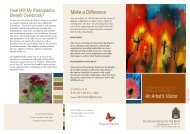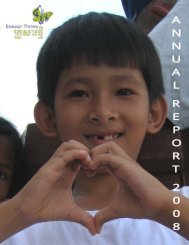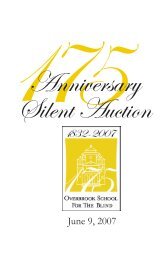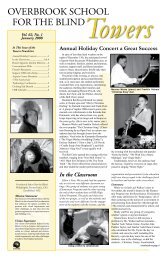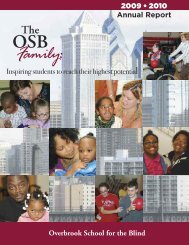Towers, Volume 63, No. 2, April 2009 (.pdf version) - Overbrook ...
Towers, Volume 63, No. 2, April 2009 (.pdf version) - Overbrook ...
Towers, Volume 63, No. 2, April 2009 (.pdf version) - Overbrook ...
You also want an ePaper? Increase the reach of your titles
YUMPU automatically turns print PDFs into web optimized ePapers that Google loves.
Director’s MessageBy Gerald Kitzhoffer, DirectorIn this year of the Louis Braille bicentennial,our thoughts, as educators of studentswho are visually impaired, turn to literacy andwhat literacy means for our students, for us,and for society in general.Who was Louis Braille? He was an exceptionalman who at 16 years of age had completedthe design of the Braille Code, whichaccording to C. Michael Mellor in his bookLouis Braille: A Touch of Genius “laid thefoundation of literacy for generations of blindpeople.” Louis himself lost much of his sightthrough a boyhood accident in 1812 at theage of three, and was completely blind twoyears later.The Braille Code is a raised dot readingand writing system that uses cells made up ofsix dots, two across and three down. Throughthese cells, the braille user has at his or herfinger tips the patterns necessary to representall letters, numbers, accents, and punctuationmarks.We honor Louis Braille’s memory and aregrateful for his achievement, and we are alsoaware that in the 21st century there are avariety of literacy needs due to the broadspectrum of the students we serve and duealso to the startling advances in technology.So, at <strong>Overbrook</strong> School for the Blind, weteach braille, even while we recognize theefficacy of such systems as recorded books.We teach computer literacy as experienced bymainstream students, and add whatever accesstechnology is appropriate for each individualstudent; then, we incorporate the technologyinto their regular classroom work. We usesign language for the students who need tocommunicate in that manner, and we supplysome students with communication devicesthat enable them to use prerecorded speechto convey their needs.We care deeply about our students, workinglovingly and diligently to ensure they have thebest possible lives now and in the future.As Director, I am proud of our staff and ofthe students and families that we serve; and Iam grateful for the legacy that Louis Braillebequeathed to us all.2<strong>Towers</strong><strong>Volume</strong> <strong>63</strong>, Number 2 <strong>April</strong> <strong>2009</strong>A publication of <strong>Overbrook</strong> School for theBlind dedicated to reporting student lifeand important events for students, parents,alumni, and friends. Published four timesa year.ISSN 1528-8587© Copyright <strong>2009</strong> <strong>Towers</strong> Press,<strong>Overbrook</strong> School forthe Blind. All rights reserved.For information regarding the educationaland specialized programs offered at<strong>Overbrook</strong> School for the Blind, contact:Gerald Kitzhoffer, Director<strong>Overbrook</strong> School for the Blind<strong>63</strong>33 Malvern AvenuePhiladelphia, PA 19151-2597Phone: 215-877-0313Fax: 215-877-2709www.obs.org<strong>Overbrook</strong> School for the BlindBoard of ManagersPresidentRobert L. D’AnjolellVice-PresidentsCarolyn FriedmanSarah S. HeckscherJ. Freedley Hunsicker, Jr., Esq.John S. LloydTreasurerF. Howard BraithwaiteSecretaryWarwick S. WheelerAlumni RepresentativeWilliam NewmanParents RepresentativeAndrea JohnsonMembersSidney C. BuckJoseph T. Doyle, Jr.Robert B. GallantPeggy GarrettPooh GephartLeonard L. MooreM. Christine MurphyRichard <strong>No</strong>lanMarjorie G. SteinGeorge Vermeire, DOCharles T. WilmerdingAngela ZagerConversations with . . .Bob AshbridgeCoordinator of the School to Work Program,Head Wrestling Coach, OSB Alumnus, Presidentof the EAAB (Eastern Athletic Associationfor the Blind), husband, father, and activemember in his community, Bob Ashbridge isa man of many parts who graduated fromOSB in 1976 and has been working here since1981. A graduate of Kutztown University(then called State College), with a degree inSpecial Education for the Visually Impairedand Elementary Education, he is currentlyfinishing course work through the Universityof Pittsburgh towardhis Supervisor’sCertificate.A big man with aseemingly stern lookbut a friendly mannerand genuinelygentle disposition,he is energized byall that he does.Underlying his workis an obvious lovefor <strong>Overbrook</strong>.“I could happily talk about <strong>Overbrook</strong>Bob Ashbridgeall day,” he says. “It’s a great place to work,and it’s where I got my start in life, learningin a nurturing environment, being constantlyencouraged to stretch myself as a studentand as an athlete, forming life-longfriendships.“I wish for our students now what I hadthen,” he adds, “and try to do everything I canto help them achieve their goals and constantlycreate new ones.”He is appropriately proud of being partof the committee that helped launch the WhiteHall Pilot Project, and credits the othercommittee members—Jackie Brennan, DaelCohen, Sandy Dobrowski, Helene Marano,and Judy Van Naerssen—for making theproject a great success.Supported by a Daily Living SkillsCurriculum, the Core Curriculum, and lotsof work by many staff members, two studentsoccupy separate apartments in White Hall,working their way toward transitioning to lifeafter <strong>Overbrook</strong>.As Mr. Ashbridge puts it, “It’s good to seethem rise to the challenge. They continue tolearn how to do more and more for themselvesand to learn more and more about themselves.”As an OSB alumnus, Mr. Ashbridge is verydirect about the source of his pleasure: “It’sabout blind individuals going on to be independent.Each time a person who is blind exhibitsindependence, other blind people are encouragedand motivated, and sighted people beginto understand that we are defined by abilitiesand accomplishments, not limitations.”His pride in the school and encouragementof the students are apparent in everything hedoes. He is passionate about wrestling andcheerleading—“Good for our students and theschool and a learning experience for the public.The cheerleaders win this year at Cheers forCharity was great!” He is committed toensuring that the School to Work Programconsistently meets the needs of the studentsit serves. He points out that our school playeda key role in forming EAAB and that wehave consistently supported it. And, finally,he notes: “<strong>Overbrook</strong> is the biggest thingin my life. It prepared me for success andcontinues to provide an avenue for me to givesomething back.”Larry Kendrick“There’s never a bad day at <strong>Overbrook</strong>,”Teacher Aide Larry Kendrick says. “I enjoythe kids and feel lucky to be paid for the workI do. The atmosphere is friendly and it’s likea family oriented job.”A man who believes in giving back tothe community, Mr. Kendrick is a nativePhiladelphian and graduate of <strong>Overbrook</strong>High School. He talks about always knowingthat he had to have a purpose in life, had tobe doing something that he believed in,something worthwhile. “And it all cametogether for me here at <strong>Overbrook</strong>,” he says.“I like the flexibility of being a TeacherAide, responding to what the teacher wants andwhat the student needs,” he points out. “Myposition gives me the opportunity to help thestudents advance while enjoying interactingwith them. I treat them all like my ownchildren, looking after them with a sense ofhumor, like my own Dad did.”continued on page 3



